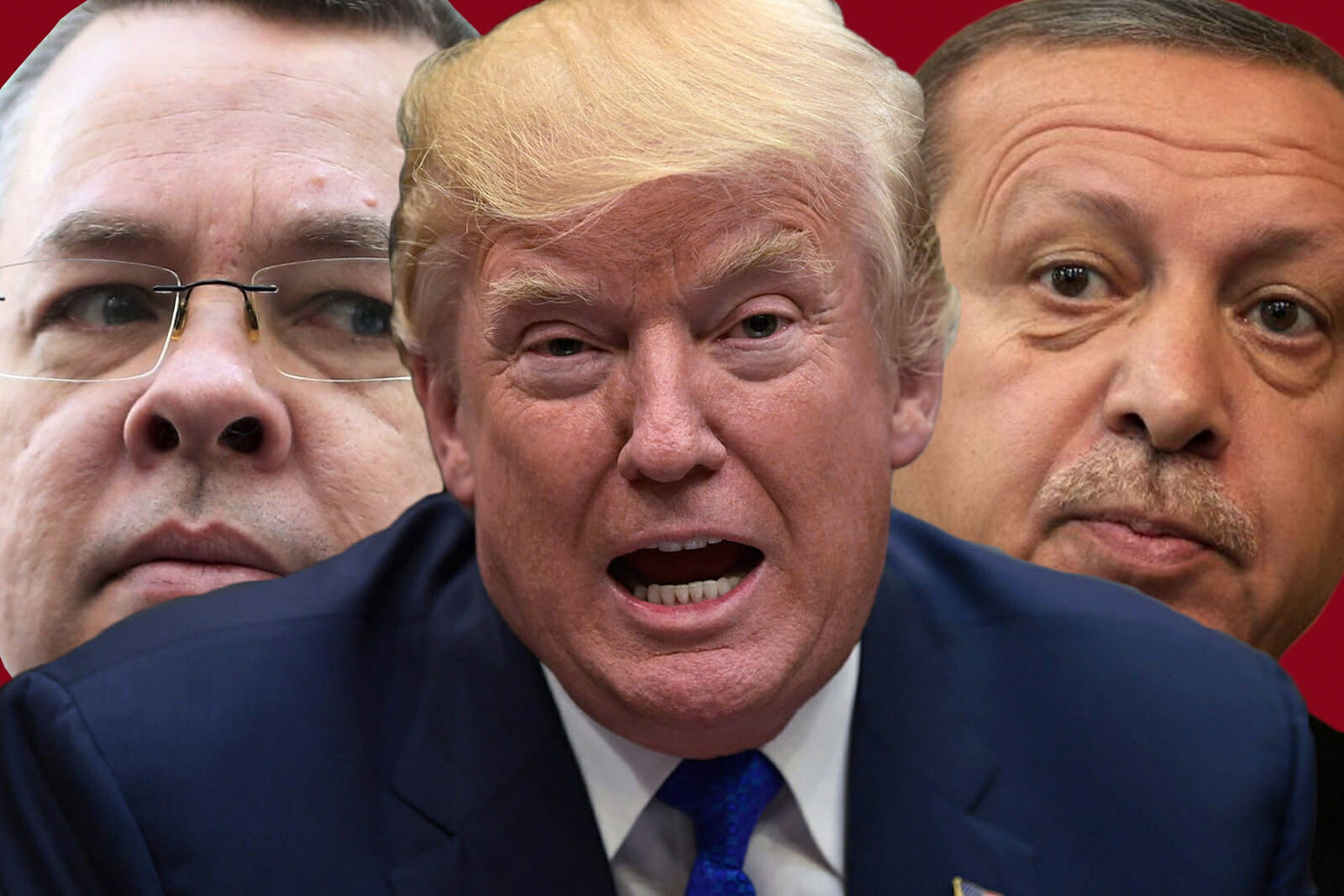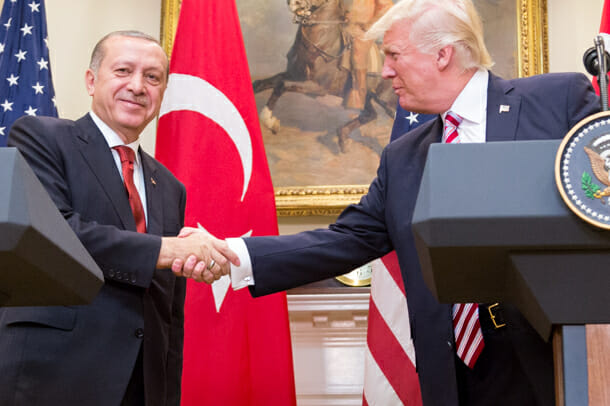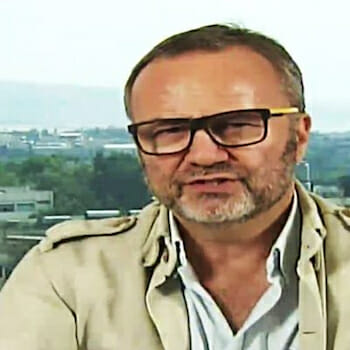
America’s Real ‘Threat’ in the Middle East is not Iran, but Turkey
Trump’s announcement in late July that he’d be happy to meet with Iranian leaders shocked the world and certainly caught Israel off guard. But Americans should be less concerned about Iran being their singular salient focus in the Middle East and worry more about Turkey and the midnight express that Trump is about to board with a Middle Eastern leader Steve Bannon recently called on CNBC the most ‘dangerous man in the world.’
Turkey is going rogue. President Erdogan’s earlier hopes at the beginning of Trump’s term in office to forge closer ties than those of Obama, were dashed recently when both Trump’s people and Erdogan’s misunderstood a nod and a wink over the release of Pastor Andrew Brunson.
The result is that the US president now has gone ‘auto-Trump’ with sanctions. This has been somewhat foolishly provoked by a petulant response from Erdogan with counter sanctions against US officials and threats this week to boycott American products.
Trump’s blocking a deal to supply Erdogan’s airforce with F-35s fighter jets will hurt and we can expect a media baptism of fire about Turkey’s abysmal human rights record in the coming days.
Yet relations between the US and Turkey haven’t been great for a long time, even as far back as 2003 when Turkey refused to let US troops station themselves there for the Iraq War. Of late, Erdogan is a thorn in Trump’s side in Syria, as Ankara is directly opposed to US-backed Kurdish forces controlling a huge swathe of the north leaving Pentagon officials referring to the present dialogue between Ankara and Washington as “hostage diplomacy.”
But it’s worse than that. Both Erdogan and Trump are so similar to one another and their egos are both leading the crisis into the abyss, leaving some wondering if there is more to the spat than meets the eye. They both loath the media and its probing eye, hate democratic process and have a woeful knack for flip-flopping on policy. They are both delusional about their significance, historically, as leaders of their own countries.
According to geopolitical analysts, the Turks are holding out for a bigger deal which would give them the exiled scholar Fethullah Gülen, who they believe was behind the failed coup attempt of July 2016; to be supplied with no-strings-attached US-made F-35 fighter jets and for Trump to stop backing the Kurds.
The United States will impose large sanctions on Turkey for their long time detainment of Pastor Andrew Brunson, a great Christian, family man and wonderful human being. He is suffering greatly. This innocent man of faith should be released immediately!
— Donald J. Trump (@realDonaldTrump) July 26, 2018
In fact, Erdogan might get this last wish sooner than he thinks. The Kurds in Syria are in talks to strike a peace deal with Assad’s Syria, which would be a major blow to Trump, who will undoubtedly stop financing them if they succeed.
But why is Trump so obsessed with Brunson? The truth is, he isn’t. Trump always looks for the sweetener from his opponent as a token gift, before negotiations begin, which gives him political collateral – which he believes is the critical leverage. It’s really about where the 600 pound gorilla sits in the room. He did the same with North Korean leader Kim Jung-Un over the bodies of US servicemen held by the North Koreans. He only has one modum operandi, which is what the Turks don’t understand.

Brunson was supposed to be the requisite token of servility which Trump needed from Erdogan before the real talks began, which Washington hoped would reverse a decision taken in 2017 to buy an S-400 missile system from Russia.
Trump doesn’t care less about Brunson’s fate. This row, which is likely to break records, as the US imposes sanctions on a NATO member, has far reaching implications though and goes beyond Trump’s cavernous disability to engage in any diplomatic process.
Turkey enjoys a number of privileges in DC and in the West in general. But what Erdogan represents is the very personification of what America historically despises: autonomy.
In the Middle East and certainly the Arab World Turkey is trying to develop as a regional superpower itself as it joins a small club of countries which has elected to not sign up to neither Saudi Arabia’s hegemony nor that of Iran’s. Forging closer ties with Iran and joining forces with Qatar it strives to develop its armed forces and extend its hegemony to other countries in the region and in Africa. However, ostracizing Turkey will only accelerate these lofty yet dangerous ambitions and force it even closer to the one super power which can make it all happen: Russia.
The very latest step by Turkey – to ditch its promise to reduce its oil purchases from Iran – is serious. It leaves only one country, India, with the spotlight remaining on it, whether to give in to US bullying over secondary sanctions, which, at the time of writing, it looks as though it has done. Erdogan will no doubt look to Iran and Russia for support to counter any financial impact that Trump’s cavorting buffoonery has in store for it, as the lira takes a daily beating. And Qatar too, which has just stepped in with a 15bn dollar rescue plan, in the form of investment.
If the row gets out of hand, we will see in a very short space of time a new threat to the US, Israel and Saudi Arabia in the region. Turkey’s expanding geo-military presence which Trump has actually created himself.
The problem with Trump’s threats and his unique style of bullying and throwing tantrums is that they only usually garner very short and limited positive press coverage for himself. In Korea, we see little advancement, in Europe, NATO members just humoured him with promises which they failed to keep and Iran only gets stronger by the day. Allowing Turkey to fall into the palm of Putin would be a summit of exuberant stupidity from Trump as Russia gains each day from his fear and blundering in the region. With the Kurds about to break free of his support in Syria, it may well be his wish of getting out of the country may transpire to be a nightmare scenario of him getting kicked out by Putin. Expect more journalists with difficult questions to be barred from press conferences when that happens.

